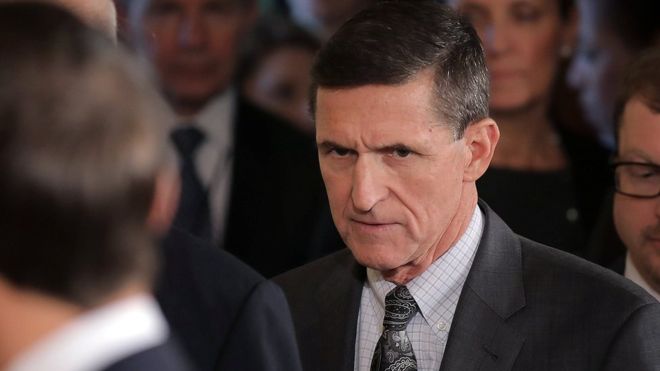Donald Trump's national security adviser, Michael Flynn, has resigned over his contacts with Russia, the White House has announced.
Mr Flynn is alleged to have discussed US sanctions with the Russian ambassador before Mr Trump took office.
He is said to have misled officials about the conversation.
Earlier, US media reported that the Justice Department had warned the White House about the contacts late last month.
They said that Mr Flynn might be vulnerable to Russian blackmail.
It is illegal for private citizens to conduct US diplomacy, and the calls happened late last year before Mr Flynn was appointed to the administration.
A number of senior Democrats had called for Mr Flynn to be fired.
The national security adviser is appointed by the president to serve as his or her chief adviser on international affairs and defence.
What did Mr Flynn say about the phone call?
In his letter of resignation, Mr Flynn said he had "inadvertently briefed the vice-president-elect and others with incomplete information regarding my phone calls with the Russian ambassador".
A White House statement said Lt Gen Joseph Keith Kellogg had been appointed as interim replacement for the post.
Mr Flynn, a retired Army lieutenant general, initially denied having discussed sanctions with Ambassador Sergei Kislyak, and Vice-President Mike Pence publicly denied the allegations on his behalf.
But he came under further pressure on Monday when details of his phone call emerged in US media, as well as reports the justice department had warned the White House about him misleading senior officials and being vulnerable to Russian blackmail.
According to the Washington Post, the message was delivered by then-acting attorney general Sally Yates, who was subsequently dismissed by President Trump for opposing his controversial travel ban.
Russian MP Konstantin Kosachev, quoted by the Ria Novosti news agency, suggested the new US president may have been backed into a corner over Mr Flynn's resignation or his administration may have been "infected" by anti-Russian sentiment.
Kremlin spokesman Dmitry Peskov denied on Monday that Mr Flynn and Mr Kislyak had discussed lifting sanctions.
 Credit:bbc





